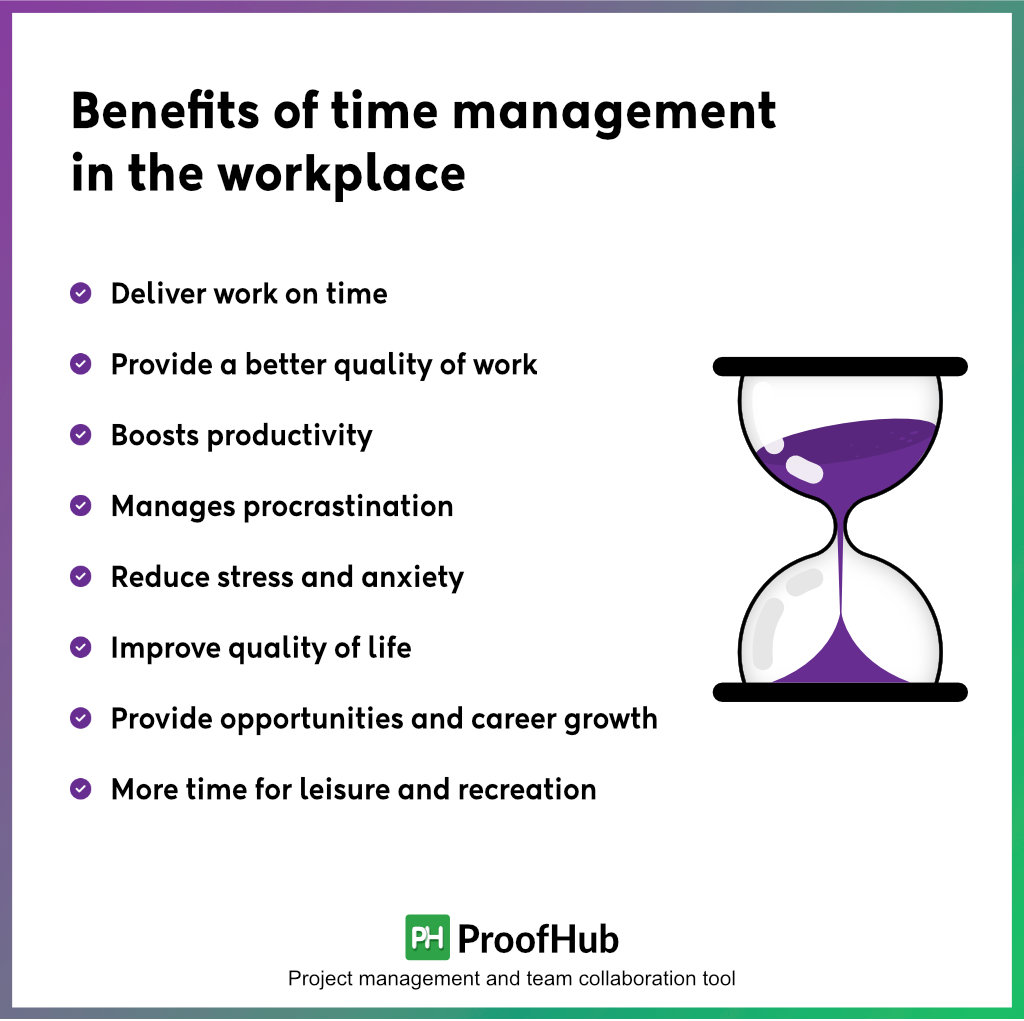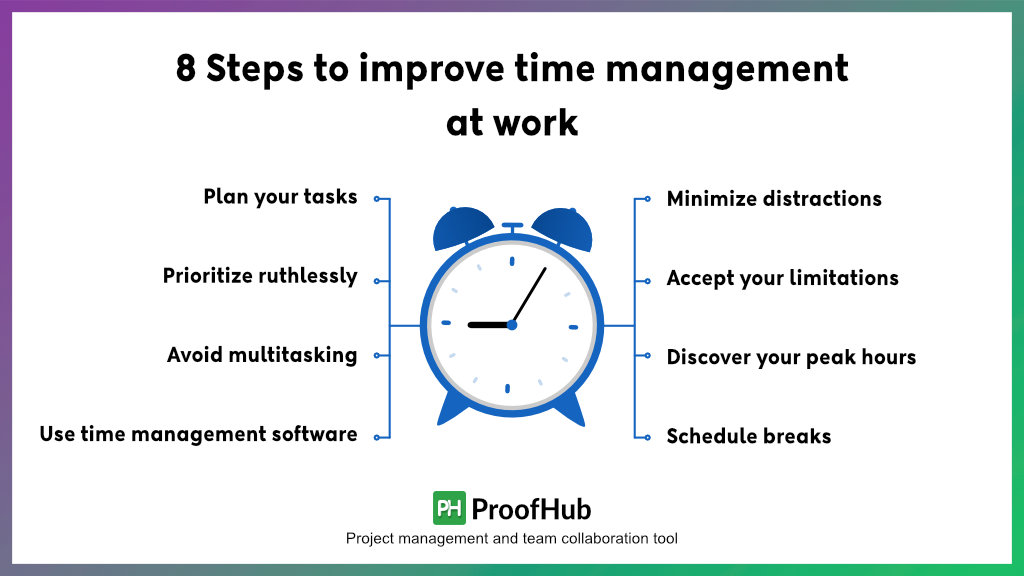The importance of time management in the workplace cannot be denied. Time is one of those things working professionals can’t get enough of. Whether you’re a newbie or a veteran, you always need another hour to tick tasks off your to-do list.
It’s difficult to take control of every minute of your day, especially when there are too many distractions. Since childhood, our parents and teachers have advised us to spend time and money wisely.
In this article, we will take you back to the importance of time management but with a little spinoff. Today, we will discuss the importance of time management at work.
A Free guide to help you with proven ways to lead a project from start to finish, without confusion or jargon.

Before delving straight into what is the importance of time management, let’s first see what time management is:
What is time management?
Time management is the process of planning and exercising conscious control of the time spent on specific activities to work smarter rather than harder. It is a juggling act of various things that help you increase efficiency and strike a better work-life balance.
Improving time management at work allows you to enhance your performance and achieve your desired goals with less effort and more effective strategies. However, failing to manage time or poor time management skills at work can result in:
- Missed deadlines and appointments.
- Procrastination and lack of focus.
- Lack of professionalism.
- Inefficient workflow and low work quality.
- Unwanted stress.
- Poor professional reputation.
- Strained workplace relationships.
- Financial penalties.
- Work and life imbalance.
| P.S. Time is an irreplaceable asset. It is more valuable than money, especially in today’s fast-paced, overly-competitive business world. You can get more money, but you cannot get more time. Be sure that you spend your time where it matters most to you. |
Why is time management important in the workplace?
Effective time management in the workplace is crucial for both individual and organizational success. It’s not about working harder, but working smarter to achieve more in less time. This translates to meeting deadlines, boosting productivity, and delivering higher-quality work.
Employees feel less stressed, achieve tasks with greater focus, and gain time for personal well-being. For businesses, this means projects stay on track, resources are optimized, and customer satisfaction improves. Ultimately, good time management fosters a culture of efficiency and achievement that benefits everyone.
What are the important benefits of time management in the workplace?
Timewatch in its time management statistics report highlights the main benefits of time management.
91% of survey respondents agreed that better time management would reduce stress at work. 90% agreed it would increase productivity, 86% think it would improve focus on tasks, and 83% say it will lead to better decision-making.
Many advantages come along with proper management of time. In your professional life, time management can benefit you in the following ways:

1. Deliver work on time
Effective time management at work helps employees to deliver work on time. It also helps them to manage their workload most effectively. When they have time-boxed tasks, their brain gets rewired to follow the structure and accomplish those activities within the desired time frame. Thus, employees can easily deliver work on time if they have managed their time well.
2. Provide a better quality of work
As a dedicated employee, you are expected to provide work of certain quality and standards. With the proper utilization of time and prioritization of activities, one can easily provide a better quality of work. Prioritization helps you focus on important tasks by keeping them in the highest priority which enables you to work on them with full attention and focus. Hence, the quality of the work is improved.
3. Boost productivity
The goal of time management is to improve workplace productivity. It is no secret that effective time management skills at the workplace make you more productive and efficient as a working professional. These skills help you finish tasks as early as possible without compromising on the quality of work.
Your overall productivity often goes for a toss when you’re working on unimportant tasks but effective time management skills let you tick off tasks that are both important and urgent on time.
Read more: Explore these 22 must-have time management apps for 2026.
4. Manages procrastination
“I will do it later” – This is an excuse that we all have made at some time. The meaning of time management is not just about doing more in less time but also reducing the urge to delay and procrastinate over important tasks.
Applying good project time management tricks enables you as a founder, leader, or employee to work smarter rather than harder. It instantly eliminates procrastination by ensuring that you’re familiar with the tasks added to your to-do list and when they need to be finished.
5. Reduce stress and anxiety
Another goal of time management is to reduce employee stress and anxiety that people face while working. There are times when employees feel overwhelmed due to too much work on their plates.
This can not only hamper your productivity but also take a toll on your overall health. Excessive stress and hypertension can lead to heart disease, depression, obesity, and more. By knowing what to do we can reduce unnecessary stress and tensions in our life.
6. Improved quality of life
Effective time management skills don’t just benefit your professional life but can also improve your life outside of the office. If you keep things under control on the professional front, you get more time to focus on your personal life and relationships.
Knowing the fact that tasks and activities are on track will bring a sense of calmness to your personal life. As you feel calmer and less stressed out, your quality of life improves automatically.
7. Provide opportunities and career growth
Being punctual with your work will not only increase your effectiveness but will also help you earn a good reputation at work. When managers know that you always complete your tasks on time, it could lead the way for more promotional opportunities at work.
8. More time for leisure and recreation
When was the last time you had time for yourself to do things that you enjoy? Can’t remember, right? Fortunately, with good time management at the workplace, you get more free time in your day to do the leisure and recreational activities that make you happy.
Ultimately this helps you to create the perfect balance by working smart all day and having a reward of your choice in return.
8 steps to improve time management skills at work

Time management is not rocket science. Frankly, anyone can learn this art with a little practice and learning. So here are a few steps that tell you how to become a time management expert and how to improve time management skills in the workplace:
1. Plan your work
Best-seller author Brian Tracy once said, “Every minute you spend in planning saves 10 minutes in execution; this gives you a 1,000 percent Return on Energy.”
Planning plays an important role in time management as both go hand-in-hand with each other. You can make the most of your time only when it is thoroughly planned. When we talk about planning, you don’t necessarily have to follow a strict routine, instead, it means making smarter decisions by knowing the right time to do a task or an activity.
The idea behind time management is to work smarter rather than harder and make time to do other things as well. You can use project planning software to plan your tasks and save time smartly.
Pro tip: List down all the tasks you need to accomplish. Break them into smaller, manageable steps. This provides a visual representation of your workload.
33% of people employ a to-do list as a tool for organizing their time and tasks.
2. Prioritize your tasks
Prioritizing your daily tasks is the key to successful time management. That said, many employees start their day with unimportant tasks or something that can be easily done later.
Prioritization helps you realize that not everything you do is important. It is important to focus on your priorities to achieve success at work. Figure out the most important tasks and the urgent ones. This categorization will help you focus on what needs to be done. You can use various project management tools that help you set your priorities straight from the day a project starts.
Pro tip: Start your day by creating a to-do list, then use a prioritization framework (like the Eisenhower Matrix) to identify the most critical tasks that align with your goals.
The Eisenhower matrix is a highly effective time management technique, with 100% of users experiencing a sense of control over their work 4 to 5 days a week.
3. Avoid multitasking
Multitasking is one of the biggest time-wasting activities. Instead of accomplishing too many things, you end up achieving nothing out of them. The best way to utilize your time is to take one thing at a time and accomplish it before jumping to the next thing. Make a list of tasks that need to be accomplished in terms of their priority. Not only you would be able to focus better but there would be fewer distractions as well. And no distractions mean less likelihood of mistakes.
Pro tip: Avoid multitasking – it reduces productivity. Instead, dedicate focused time blocks to each task, using techniques like the Pomodoro Method.
4. Minimize distractions
In our everyday life, distractions cost us many valuable hours in a day. Mobile phones, chatty coworkers, and social media are some of the common distractions at work that almost cost us three hours a day.
To not let these distractions eat up your time, it’s better to cut them off completely from your schedule. Take a moment to learn about the things that distract you. If social media and mobile phones are halting your productivity, set a fixed time in a day when you can check your social media.
Pro tip: Identify your biggest time sinks: Social media, email, unnecessary meetings? Schedule dedicated time slots for specific tasks, minimizing distractions during focused work periods.
5. Schedule breaks
Taking regular breaks while working is an effective way to stay productive all day. But its effectiveness is subject to management risk, especially when you start taking too many breaks. You can’t power through a big project or task in one go, you need a break. What’s even better is having a well-scheduled break time.
Pro tip: Take a walk, do some quick stretches, or plug in earphones and listen to your favorite music, do whatever helps you to relax and get back to work with energy later – but don’t take more than 10 minutes.
6. Find your most productive hours
The next time management hack is to match your highest priority work to your highest productivity hours. The basic idea here is to check in with yourself frequently to track when, where, and how you’re the most productive. Research clearly shows our day is driven by cycles that affect how alert and motivated we are.
For example, you might be at your highest brain capacity, with your best focus and attention, before lunch hour, and slow down significantly in the evening. So, if you have a project that involves critical decisions and complex thoughts, the best case scenario is to manage it in your “golden hours”.
Pro tip: Schedule important tasks when you’re most energized and productive, whether it’s early mornings or focused afternoon blocks. Listen to your body’s natural rhythms.
7. Accept your limitations
Even with 110% effort, there will be occasions when you simply cannot get things done within the specified time frame. This is the point where you accept that there are limits to how productively and efficiently you can manage your time.
For example, outsourcing and delegation are your best shots if you have twice the normal workload in a day. Don’t just assume that you can get everything done that you want in any given time frame. Remember, doing this will only make it harder to manage your time effectively.
Pro tip: Don’t overload yourself. Know when to say no and delegate tasks. Learn to politely decline tasks that don’t align with your priorities or workload.
8. Use a time tracking software
This is the best thing you can do to significantly improve your time management skills without making things complicated. Smart time management is the need of the hour for project managers and teams juggling multiple tasks at the same time.
Without using a good time-tracking tool, you are putting yourself and your team at a great disadvantage. When you don’t know where exactly your team’s time is going, and which tasks are taking how much time, how are you supposed to detect time wastage at the workplace?
On the other hand, using a powerful time-tracking software, like ProofHub, that also offers a suite of project management and team collaboration features enables you and your team to stay on top of your schedule.
Learn how to use ProofHub’s time tracking system to keep track of your team’s time and productivity effectively in the video below.
ProofHub key features as a time-tracking software
- Add timesheets: Add multiple timesheets to record time data and use them for accurate client billing, payroll processing, estimation, and management accounting, and save money for your company by tracking the efficiency of your team members.
- Set time estimates: Give your team a clear target time by setting time estimates for different tasks. Define how much time it should take to get work done. Know if the time taken exceeds the estimated time or is completed within set time limits.
- Have a Bird’s eye view for all time data: Using time tracking software provides you with a Bird’s eye view of all time data of individuals across all projects without having to jump through projects.
- Track time manually or using timers: Track how much time you are spending on each task by tracking time manually or using timers. Start and pause timers every time you switch tasks or take a break.
- Time reports: Create custom time reports of people and projects. See billable hours, billed hours, and non-billable hours from your timesheets.
- Improved privacy: You can limit the visibility of your timesheets to selected people to prevent unauthorized access.
- Export and Archive timesheets: You can export timesheets and archive them for later use.
P.S. Time is an irreplaceable asset. It is more valuable than money, especially in today’s fast-paced, overly competitive business world. You can get more money, but you cannot get more time. Be sure that you spend your time where it matters most to you.
In conclusion
Effective time management at work is important for optimizing productivity and achieving goals effectively. By prioritizing tasks, setting deadlines, and avoiding distractions, individuals can efficiently utilize their time, reduce stress, and enhance work-life balance. It enables better decision-making, improved efficiency, and increased overall satisfaction in personal and professional pursuits.
And with ProofHub teams can manage their time effectively at the workplace. The platform allows for seamless task delegation, time tracking, and progress monitoring, ensuring that everyone is on the same page.
I hope this post will help learn about the importance of time management in the workplace.
Also read–
- 22 Effective time management strategies for work
- 12 Time management tips for work to achieve more
- 20 Ultimate time management apps for productivity
FAQs
What is time management in the work field?
Time management in the workplace refers to the process of planning, organizing, and controlling how you spend your time at work to achieve your goals and responsibilities efficiently and effectively. It’s not just about working faster, but rather working smarter to maximize your productivity and minimize stress.
What are the 5 keys to time management?
- Planning & prioritization: Define your goals and set clear priorities for each day or week.
- Focus & avoid multitasking: Dedicate focused time blocks to each task, minimizing distractions and multitasking.
- Effective scheduling: Utilize tools like calendars and to-do lists to schedule tasks and manage your time efficiently.
- Mindful breaks & self-care: Schedule regular breaks to refresh and avoid burnout. Prioritize your well-being for sustained productivity.
- Leveraging technology & delegation: Use time management software and delegate tasks when appropriate to optimize your workflow.
What are the goals of time management?
- Increased productivity: Complete more tasks in less time, achieving your goals more efficiently.
- Reduced stress & improved well-being: Feeling less overwhelmed and having more control over your time leads to lower stress levels.
- Enhanced job satisfaction: Meeting deadlines, delivering quality work, and feeling productive fosters positive job experiences.
- Improved decision-making: Focused time allows for clearer thinking and more informed decisions.
- Career advancement: Effective time management skills are valued by employers and contribute to career development.
What are the 4 main principles of effective time management?
- Clarity: Set clear goals and objectives for your workday.
- Prioritization: Identify the most important tasks and focus on them first.
- Planning & organization: Organize your tasks and schedule your time effectively.
- Action & discipline: Take action on your tasks and avoid procrastination.
What are the 3 key concepts of time management?
- Time tracking: Understanding how you spend your time to identify areas for improvement.
- Task management: Choosing the right tools and strategies to organize and prioritize your tasks.
- Personal awareness: Identifying your strengths, weaknesses, and work style to optimize your approach.

